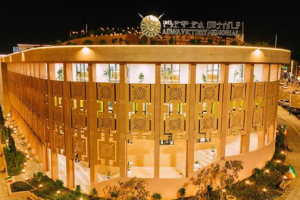BY MULUGETA GUDETA
There are some 52 different countries in Africa groups with hundreds of different ethnic groups, speaking hundreds of different languages. Africa should dubbed the museum of ethnicities and languages. According to available information, there are a total of 1500-2000 African languages. Africa is a continent with a very high linguistic diversity; there are an estimated 1500-2000 African languages gathering approximately 140 languages with some eleven millions speakers scattered in Central and Eastern Africa. With anywhere between 1000 and 2000 languages, Africa is home to approximately one-third of the world’s languages. The diversity of Africa’s languages is evidenced by their populations. In total, there are at least 75 languages in Africa which have more than one million speakers.
This is sufficient evidence to show how Africa is a huge continent where one in three people of the world speak at least one African language.
The same can be said about African cultures. According to another data, “The Culture of Africa is varied and manifold, consisting of a mixture of countries with various tribes that each have their unique characteristic from the continent of Africa. It is a product of the diverse populations that inhabit the continent of Africa and the African Diaspora. Generally, Culture can be defined as a collective mass of distinctive qualities belonging to a certain group of people. These qualities include laws, morals, beliefs, knowledge, art, customs, and any other attributes belonging to a member of that society.”
the same can be said about ethnicity in Africa. “Africa has numerous ethnic nationalities all with varying qualities such as language, dishes, greetings, and dances. However, all African peoples share a series of dominant cultural traits which distinguish African Culture from the rest of the world. For example, social values, religion, morals, political values, economics, and aesthetic values all contribute to African Culture. Expressions of culture are abundant within Africa, with large amounts of cultural diversity being found not only across different countries but also within single countries.”
What is important in the case of Africa is the traditions and cultures these ethnic groups share between themselves Africa has numerous ethnic nationalities all with varying qualities such as language, dishes, greetings, and dances. However, all African peoples share a series of dominant cultural traits which distinguish African Culture from the rest of the world. For example, social values, religion, morals, political values, economics, and aesthetic values all contribute to African Culture. Expressions of culture are abundant within Africa, with large amounts of cultural diversity being found not only across different countries but also within single countries.
We may perhaps use an example to show how Africa is a huge continent not only in landmass and population size but also in its linguistic, cultural, and ethnic diversities by citing an example. China is of course a big country with the largest population in the world, estimated to be more than 1.3 billion. By the way Africa too has similar population size to that of China. However, what makes Africa different from China or any country or continent in the world is the linguistic, ethnic and cultural diversities.
China is one of the few countries in the world with an ethnically and linguistically homogeneous population. All Chinese speak one language called Mandarin and more than 98 per cent of them belong to one ethnic group or nationality known as the Han nationality. These features have had more advantages than disadvantages as far economic development is concerned. The fact that Chinese speak one language and belong to one nationality has helped them develop faster than any country, at least in the last 30 years or so when China witnessed its fastest and sometimes miraculous economic ascent from poverty to wealth.
This does not however mean that linguistic and cultural homogeneity is a precondition for faster economic growth. China had been the same poverty-stricken, backward and feudal China for many centuries while still having a huge population that speak one language and share one culture and belief system known as Confucianism or Buddhism.
It did not however witness fast economic growth rates that were evidenced starting from the 1970s after historic leader Mao Zedong died and was replaced by Deng Tsiao Ping, the historic reformist leader who changed China’s course from socialism proper to “market socialism” by combining the some features of capitalist economy and combining with the ownership system of socialism whereby the state owns and runs the economy on behalf of the people.
The Chinese growth and development scenario does not however rule out the possibility of countries with bigger populations and diversified languages and cultures do not have the potentials for growth and development. The United States and Europe are good examples of continents that have witnessed phenomenal growth although some of the growth resulted from colonial exploitation, the slave trade in the case of America. According to this logic Africa, despite its diversities also possesses all the qualifications for becoming one of the economically advanced countries in the world sooner or later.
China developed in its own specific ways so did Europe and America and so will Africa in the future. There are no models of economic development that work for all places and all times. What is important for a country or a continent is to combine all the factors of economic growth, including language and culture, with the natural resources to produce a growth process that would change liabilities into assets and challenges into opportunities.
The Chinese history of economic development is more relevant to Africa than any other examples. China, like Africa has witnessed colonial occupation, feudalism and many wars and internal conflicts during its feudal period. Many countries in Africa have also gone through periods of colonialism, imperialism and feudal or tribal rules. The lesson for Africa is that whatever the level of economic development or cultural conditions a country may find it in; there is always the possibility of finding a way towards economic development. In the case of Africa, the challenge is to put linguistic and cultural diversities as positive factors for creating a sustainable economic growth scenario.
Despite Africa’s cultural diversities, there are also many similarities that can be used for promoting unity and economic development within Africa. “Even though African cultures are widely diverse, they are also, when closely studied, seen to have many similarities; for example, the morals they uphold, their love and respect for their culture, as well as the strong respect they hold for the aged and the important, i.e. kings and chiefs.” Like in China, Africans hold high regards for elders and respect their old traditions and try to assimilate them in the modern national and global contexts.
The Chinese developed not by ignoring or undermining their traditions but by respecting and modernizing them so that they can serve the cause of economic development and the modernization of society in general. “Africa has influenced and been influenced by other continents. This can be portrayed in the willingness to adapt to the ever-changing modern world rather than staying rooted in their static culture. The Westernized few, persuaded by American culture and Christianity, first denied African traditional culture, but with the increase of African nationalism, a cultural recovery occurred. The governments of most African nations encourage national dance and music groups, museums, and to a lower degree, artists and writers.”
The way forward for Africa is to put an end to separatism, tribalism, ethnic divisions and cultural bigotry and follow the path of continental unity in diversity. The trouble for Africa at this stage is the fact that it has launched its vision for unity and economic development at a time when external factors are putting powerful hurdles on its path. In addition to internal conflicts, African countries are also facing external pressures from unfriendly quarters in the Western world that would like to perpetuate dependency and foreign aid in the continent instead of helping African achieve self-sufficiency, autonomous development and freedom from hunger and poverty.
Many countries have left behind this phase of their history behind and embarked on a sustainable road to cultural and economic growth. China ended foreign intervention during the early decades of the 20th century, at a time when Africa was just beginning to fight for political independence. The anti-colonial struggle has taken long decades and those were largely lost decades that claimed the resources of the continent and the oppression suppression of its people.
Although it has taken many tolls, the anti-colonial struggle has now led to the total independence of Africa although it will take yet many long decades for Africa to emerge from its present state of poverty as articulated in the African Union vision for 2065 when the continent will achieve the objectives of unity and economic development as well as cultural renaissance that is in full swing even at this time with the promotion of regional integrations in many parts of the continent.
According to some studies made to establish the relationships between economic integrations in Africa, the process of integration is often facilitated by cultural and linguistic affinities of countries sharing borders. According to one study on the subject of the role of cultural or language in the process of economic integration in Africa, “The influence of language in trade, especially in cross border trade in Africa, dates back to the pre-colonial era, where communities used to practice barter trade.
“Studies have shown that a significant level of proficiency in the language spoken in the country of destination is an integral part of the human capital of each immigrant worker. The informal sector had become the primary source of Zimbabwe’s urban livelihoods. As such, informal cross-border trade has grown to such a level where Integration between Zimbabwe and its four neighboring countries is compactly cemented while linguistic affinity has played a positive role in the process.”
According to another study, “all African languages play a significant role in forging national unity, development and cross-cultural understanding in Southern Africa. Cross border languages are essential in enhancing cross-cultural understanding through the harmonization of mutually intelligible language varieties. Mutually intelligible languages in Southern Africa can be used to promote unity and make the speakers feel at home if they visit neighboring countries.”
The above thesis can apply for instance for Eastern-Africa regional integration where Swahili is spoken in Kenya, Uganda, Tanzania and other countries and Somali language is spoken in Somalia, Kenya and Ethiopia among others.
The Ethiopian Herald April 2/2022





